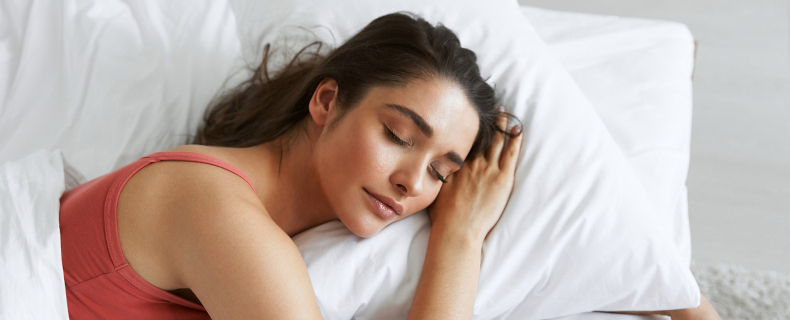Okemos, Lansing, East Lansing MI
Getting enough quality sleep is one of the most crucial aspects of good health. Not clocking enough zzz’s or experiencing poor quality sleep can be detrimental to your health by increasing inflammation throughout the body, which ups your risk of heart disease, stroke, diabetes, and other diseases. Poor sleep habits can also lead to weight gain or difficulty losing weight, mood disorders, and low libido. So, it’s a good idea to make focusing on your sleep a priority. Therefore, Dr. Christine Tenaglia, an airway dentist in Lansing, shares 10 easy ways to sleep better in 2024.
Wake up at the same time every day
Research shows that waking up at the same time every day is just as important, if not more, than going to bed at the same time each night. It relates to your body’s internal clock and conditions the brain to expect sleep. But sleeping in or waking at different times throughout the week or on weekends confuses the brain and you may not feel tired at your usual time. Therefore. Dr. Tenaglia recommends getting up at the same time every day, even on your days off.
Create an environment that is relaxing
You’ll have an easier time falling asleep and staying asleep if your room is dark and cool. Try hanging blackout curtains on your windows to block out the light so that you can go to bed early and so that the sun doesn’t wake you up before your scheduled wakeup time. Additionally, set the room temperature lower than usual because the body generates heat while sleeping. Dr. Tenaglia also recommends investing in quality bedding, including a comfortable mattress. If your bed isn’t comfortable, you’ll have a difficult time going to sleep.
Set a bedtime routine
Setting a bedtime routine gets the brain used to winding down. You can read a book or magazine. Listen to some soft music. Turn down the bedding and prepare your room for sleep. Your bedtime routine does not have to cost money or take a long time. Dr. Tenaglia advises that creating a routine, even if it is just five or 10 minutes, is an excellent way to prepare the body for sleeping.
Avoid taking naps
As tempting as it may be, avoid napping when you’re feeling tired. Of course, if you’re sick or have a medical condition that requires naps, then follow your doctor’s orders. But for most healthy individuals, naps only throw off your body’s natural circadian rhythm, and confuses the brain later at night when it’s actually bedtime. Daily naps create a cycle of chronic fatigue that is difficult to break.
Wind down with a hot bath or shower
Soaking in the bathtub or taking a shower before bed could be part of your bedtime routine to prepare yourself for sleep. Bathing before bed is not required to sleep well, but Dr. Tenaglia says it’s worth a try if you struggle to fall asleep or toss and turn all night long.
Skip eating meals too close to bedtime
Nighttime snacking is a habit for many individuals. Unfortunately, eating heavy meals or spicy food can keep you from falling asleep or cause you to wake frequently throughout the night. It’s best to avoid eating about an hour or two before going to bed, if possible. However, don’t go to bed starving either, says Dr. Tenaglia, who provides sleep apnea screenings in the East Lansing area. Going to bed hungry may also keep you up at night or cause you to wake too early the next morning. If you must have a snack right before bed, stick to something light and healthy and that won’t lead to indigestion or heartburn.
Put away screens before bed
It’s tempting to lay in bed scrolling on your phone or another device in hopes that you’ll eventually feel sleepy enough to zonk out. But unfortunately, screens emit a blue light that disturbs your body’s circadian rhythm, which is like telling your brain it’s daylight even when it’s not. Dr. Tenaglia recommends putting down your phone, tablet, or other device at least an hour before bed. If you must check-in on your phone close to bedtime, consider wearing special glasses that block blue light or enable dark mode on your device.
Exercise
Getting plenty of exercise daily has many health benefits, including helping you sleep better. When you burn calories from moving and working out, your body is actually tired at the end of the day and wants to go to sleep. And, if you are trying to lose weight or make some muscle gains, sleep is crucial so that your body has time to repair and rejuvenate.
Try natural sleep aids
Natural sleep aids may include sipping herbal tea or diffusing essential oils. Just be careful not to sip too much tea close to bedtime or you’ll end up waking throughout the night to go to the bathroom. Chamomile is the best known for its natural sleep aid. And, if you decide to try diffusing essential oils, just be sure to consult with a medical provider or herbalist on the safest method of using essential oils.
Use sleep-friendly technology
This may include a sound machine, smart mattress, or sleep tracker. While sleep-friendly technology is not required to rest well, it might help induce sleep or help you track your sleep patterns so that you can monitor progress as you implement the above lifestyle changes.
Tried everything and still not sleeping well?
If you have tried Dr. Tenaglia’s suggestions yet still experience daytime fatigue, consider a sleep apnea screening with Dr. Tenaglia. She can help determine if you are at risk of a sleep breathing disorder that could be the cause of your inadequate sleep. To learn more or schedule your consultation, contact Tenaglia Smiles by calling (517) 347-6733.

